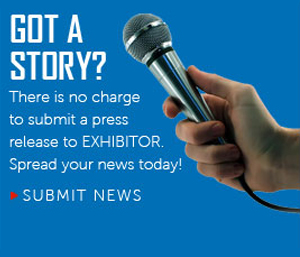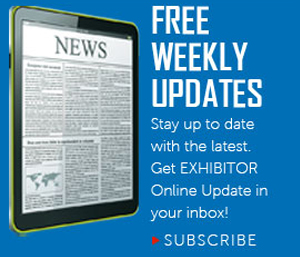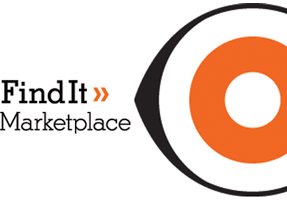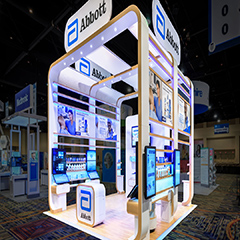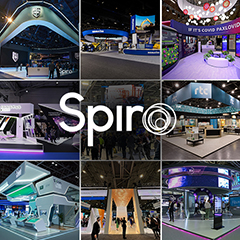|
trending
Sponsored Content
Following a revamp of production processes, beMatrix® is leading exhibitors into the future of sustainability EXHIBITOR Magazine Announces Special Award Winners in its 2025 Centers of Excellence Awards Aluvision: Modular & Sustainable Systems for Exhibits & Events IAEE Addresses Pending Shipping Strike’s Effect on Upcoming Events New York Comic Con 2024 Attracts Over 200,000 Attendees Calzone & Anvil Case Co. Taps Retail Exec TJ Milian as Chief Marketing and Sales Officer Impact XM Bolsters its Capabilities and Furthers Recent Expansion with Acquisition of Award-Winning Matrex Exhibits St. Louis Tourism Reaches New Heights: Record Growth in Visitors, Hotel Industry, and Meetings Sector Equip Exposition Continues Record-Breaking Streak as 28,500 Attend Innovative Trade Show submit your news
email newsletter
|
Sponsored Content
To Rent, Buy or Go Hybrid: Your Exhibit Decision
5/1/2019
According to industry research, business-to-business exhibitions capture over forty percent of marketing budgets for companies that attended face-to-face events.1 Anyone involved in this fast-paced segment of the marketing world understands there are many decisions that must be made along the path to success.  A handful of industries find that there is only one major "must-attend" show every year. However, most exhibit programs will include a variety of shows. Whether they are large or small, vertical or horizontal, national or regional in scope, all shows must be evaluated with the company's objectives in mind. Once the program is defined, the team's first order of business is researching and recommending the type of exhibit that will promote the brand best, showcase the company's products and services, and gain the attention of targeted attendees at each event. Today, companies typically have three approaches for securing an exhibit:
Underlying Considerations for the Rent versus Buy Decision Three fundamental issues must be explored to make the best decision: 1. Allocated budget and what it will cover 2. Quality requirements 3. Trade show program scope Setting the Budget The budget is always front and center in the minds of all stakeholders. Oftentimes, even after the budget has been set, the event manager wishes it could be bigger while the CFO thinks it needs to be scaled back. This conflict is simply a part of the corporate battle for limited resources. Although corporations define "trade show spend" in a variety of ways, it is typically part of the annual budgeting process. The amount allocated to event marketing should be set after internal discussions consider a combination of:
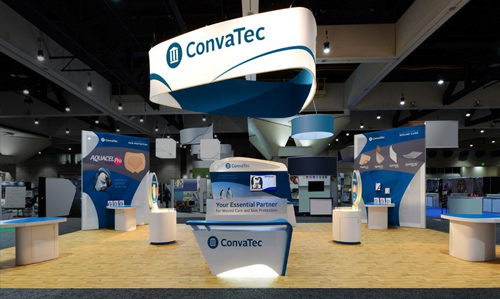 Understanding the Quality Dilemma At one point in time, rentals were just repurposed elements that exhibit companies had left over in their warehouses. This assumed that rentals sacrificed quality, making them inferior to custom-built exhibits. In some cases, this may still be true, but for most custom exhibit houses, it is far from true. For companies with robust programs, rental inventory is considered a long-term investment. Their rentals are built with quality and detail to sustain usage over multiple trade shows. And the quality of an exhibit goes beyond the materials and craftsmanship of the booth - it is also reflected in how well the graphic messaging is developed and accommodated in the booth design. In some situations, build quality is not as important as keeping costs within budget. Less expensive rental options based on modular extrusion systems may not have quite the style and finish of a custom-built exhibit, but they still provide a reasonable platform for promoting the brand. Outlining the Show Schedule For many companies, the programs include various vertical and/or horizontal events. Given that target audiences would likely be different for each show, a company's messaging and engagement activities need to be easily modified. It also could be that the company needs more/less exhibit space based on the level of the show's importance to the overall marketing strategy. With custom built exhibits, graphics can be interchanged, but the architectural design and flow remains. Therefore, when a company's show schedule requires different size booths or booth orientation varies, renting could be a more favorable option. Back-to-back shows call for detailed planning related to shipping, delivery times and availability of exhibit elements. The booth that was rented last year might be reserved by another customer this year. On the other hand, if a company attends two shows that are days apart, it would not be possible to ship the same custom booth in time to set up for the second show. A rental booth may be required for one of the shows. Renting Exhibits The industry's rule of thumb states that the cost of renting a booth should be around thirty to forty percent of the cost of purchasing a similar exhibit.2 With a good understanding of the trade show budget, the quality your company expects, and the flexibility required for your program schedule, here are reasons to consider in renting a booth, along with benefits you might gain. 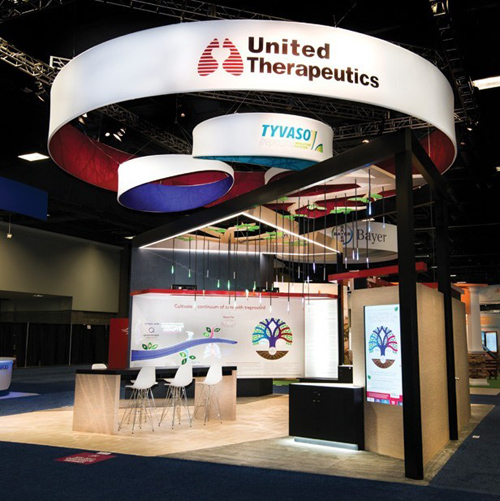 Keeping Costs Under Control Renting a booth is less expensive than purchasing one for companies that are concerned with this year's budget and have one or two shows in their program. With a less rigorous schedule, renting allows a company to adjust their exhibit design based on the target audience. A lower price tag enables the trade show budget to extend to other marketing activities that support show goals. For a start-up or early stage company, resources are precious. The demands for dollars come from many directions. Because it is difficult for them to build a case for investments in marketing activities due to a limited track record, these companies should rent to test which types of budget commitments will gain the most momentum. For rentals, companies do not have to worry about costs for damages that are not the company's fault. The booth is shipped back to the exhibit house, repaired and cleaned for the next renter. Another consideration involves funding. Unlike a rented booth as a direct expense, a purchased, custom exhibit is a significant investment, making it a "capital expenditure" in accounting terms. This purchase impacts the company's financial statements differently from the expense of renting a booth. Sometimes, funds for capital expenditures may not be available. If a company's current booth is no longer appropriate, but a new booth must be postponed until CapEx funds can be allocated, then renting is a good alternative. A company may choose to avoid CapEx even if lack of funds is not the issue. Designing a custom-built booth is an option, but they would rather rent from their design company for a committed number of shows for a set number of years. With this approach, the exhibiting company does not pay storage or maintenance, and the booth is only used by this specific customer. Some companies are willing to incur the costs associated with renting to gain flexibility, even if they attend more than three shows a year. For exhibitors with products in multiple industries, it is more beneficial to rent smaller booths than to build custom, despite the overall cost. Not to mention that a custom-built exhibit would be excessive at smaller shows when participation is still a good idea. A smaller, rented booth accomplishes this objective. Buying Exhibits - Pride of Ownership Exhibiting at a trade show is a major commitment, but it comes with the potential of a significant return. These events put company management, sales team, and other stakeholders face-to-face with targeted attendees, customers and the competition. Given these audiences, it is important that the brand is being promoted in the best possible light. The pride of ownership that stakeholders feel in their company is critical to the exhibit's overall success. A custom-built exhibit gives the event team the freedom to design it in a way that will make everyone proud. 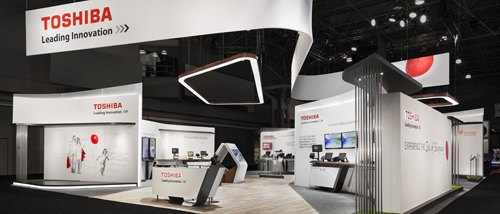 Greater Usability Purchasing an exhibit is an investment that will be leveraged and useful for years to come. Especially if a company attends multiple shows a year and needs a larger booth, the initial upfront cost is well worth it. With forethought, larger exhibits can be designed and constructed to be easily reconfigured into smaller sizes. If a company's needs varies in size and type, having multi-use elements not only saves money, but they also ensure a consistent look and feel across the shows. Customization Opportunities Unlike rental properties, a custom exhibit truly represents a brand. Here are some benefits that an event manager (and stakeholders) will see:
Hybrid Exhibits As a mix of custom and rental elements, hybrid exhibits take flexibility to a new level. There are no rules as to why a company chooses to go with a hybrid exhibit. It could be a matter of cost, or they want to complement their existing purchased pieces. A hybrid exhibit is flexible enough to adapt to purchased assets. 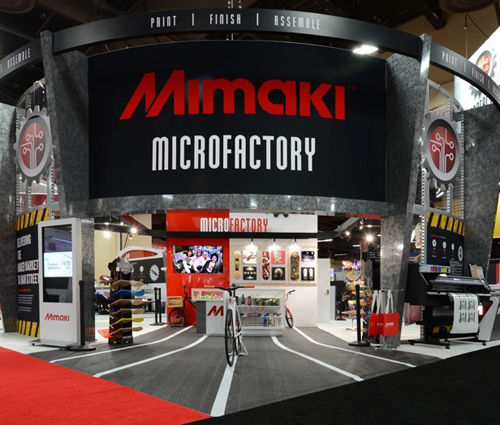 Hybrid booths are a great solution for companies delaying the build of a new booth. Perhaps the company realizes one of two things: their old booth no longer supports the brand, or certain elements cannot be adapted to a new rental exhibit. The cost-savings of not having to rent existing elements would favorably impact the trade show budget. Rent, Buy, or Both? Understanding your company's specific requirements and circumstances are critical to making the best choice for your company. Whichever route you go, work with a full-service exhibit company that's capable of supporting you from design to tradeshow floor. What to Look for in a Custom Exhibit House Company
1 2018 CEIR Marketing Spend Decision Report; Center for Exhibition Industry Research, February 2018 2 CEIR: The Spend Decision: Analyzing How Exhibits Fit Into the Overall Marketing  Brad Falberg, President
Brad Falberg, PresidentExhibitus As Founder and President, Brad is the driving force behind the Exhibitus corporate philosophy: "DESIGN MATTERS." An award-winning custom exhibit house, the company specializes in 3-dimensional design for trade shows, corporate events, user conferences, permanent installations, museums and corporate interiors. Contact: lynn.reves@exhibitus.com |
FIND IT - MARKETPLACE
|
|
||||||||||||||||||||||||||||
|
|
||||||||||||||||||||||||||||
|
TOPICS Measurement & Budgeting Planning & Execution Marketing & Promotion Events & Venues Personal & Career Exhibits & Experiences International Exhibiting Resources for Rookies Research & Resources |
MAGAZINE Subscribe Today! Renew Subscription Update Address Digital Downloads Newsletters Advertise |
FIND IT Exhibit & Display Producers Products & Services All Companies Get Listed |
EXHIBITORLIVE Sessions Certification Exhibit Hall Exhibit at the Show Registration |
ETRAK Sessions Certification F.A.Q. Registration |
EDUCATION WEEK Overview Sessions Hotel Registration |
CERTIFICATION The Program Steps to Certification Faculty and Staff Enroll in CTSM Submit Quiz Answers My CTSM |
AWARDS Sizzle Awards Exhibit Design Awards Portable/Modular Awards Corporate Event Awards Centers of Excellence |
NEWS Associations/Press Awards Company News International New Products People Shows & Events Venues & Destinations EXHIBITOR News |
||||||||||||||||||||
|
||||||||||||||||||||||||||||


